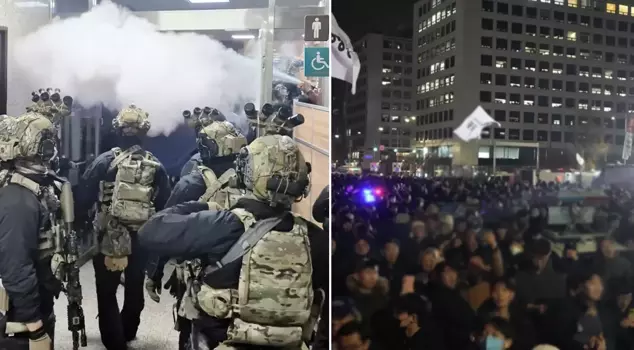
04.12.2024 10:32
In South Korea, where a six-hour state of emergency was declared last night, tensions are still high. Opposition parties are preparing to submit a motion to the parliament for the removal of President Yoon Seuk Yeol, while all senior aides in the Presidential Office submitted their resignations to the president this morning. Meanwhile, civil society organizations held protests demanding President Yoon's ousting.
As tensions continue to rise in South Korea following President Yoon Suk Yeol's unexpected declaration of martial law last night and its subsequent repeal in parliament, the situation in the country remains tense.
THEY WILL SUBMIT A MOTION FOR THE PRESIDENT'S REMOVAL
In response to Yoon's unexpected declaration of martial law, opposition parties in the country have taken countermeasures. The opposition parties announced that they would submit a motion to the parliament today for Yoon's removal from office. The motion is expected to be voted on within the week. The opposition Democratic Party (DP) had demanded President Yoon's resignation.
RESIGNATIONS CAME IN DROVES
As calls for President Yoon to resign intensified, the first blow came from his senior aides. All senior aides in the South Korean Presidential Office, including those at the level of senior secretary or above, submitted their resignations to the president this morning.
THE STREETS ARE ABLAZE
As the wave of resignations created a seismic effect in the country, numerous civil society organizations took to the streets to express their reactions. The Korean Confederation of Trade Unions, the People's Alliance for Participatory Democracy, and other NGO members gathered in Gwanghwamun Square in the capital Seoul, where they emphasized in a press statement that the President's declaration of martial law is unconstitutional and invalid. About 400 protesters demanded Yoon's removal.
An NGO official stated that Yoon has mobilized the army to pressure the National Assembly, attempted to block the entry of lawmakers and the functioning of parliament, imposed a broadcasting ban, prohibited political activities, violated the most basic rights of the people, and acted unconstitutionally by declaring martial law.
Meanwhile, another group held a press conference near the National Assembly complex, demanding Yoon's immediate removal and arrest. The group stated that they would stage a sit-in until a motion for Yoon's removal is accepted in the National Assembly. Additionally, candlelight vigils were held in squares across many cities nationwide. Local media reported that NGOs would organize numerous protests throughout the day.
THE PRIME MINISTER ANNOUNCED HE WILL CONTINUE TO SERVE
South Korean Prime Minister Han Duck-soo, in a written statement following reports that all cabinet members would resign, expressed that he understands the public's concerns. Han urged cabinet members to fulfill their responsibilities to ensure public safety and minimize the impact on daily life, stating that he would continue to serve the public until the last moment.
On the other hand, National Assembly Secretary General Kim Min-ki recalled during a press conference that 280 soldiers entered the parliament following Yoon's declaration of martial law. Kim stated that from today onwards, the entry of defense officials and police into the National Assembly would be prohibited to ensure the safety of lawmakers and the functioning of the National Assembly.
WHAT HAPPENED?
South Korean President Yoon declared "martial law" in the country, claiming that the opposition was involved in anti-state activities. Yoon stated, "Martial law aims to eliminate pro-North Korea forces and protect the constitutional order of freedom."
Hours after the declaration of martial law, 190 lawmakers in the 300-seat South Korean parliament unanimously accepted the repeal of martial law. The opposition argues that there is no war or crisis in the country and that Yoon's declaration of martial law is linked to corruption allegations against him.
According to Article 77 of the South Korean Constitution, the President can declare martial law in cases of "war, armed conflict, national emergency, or situations requiring public safety and order." The last declaration of "martial law" in South Korean history was implemented for 440 days during a military coup from 1979 to 1981, and the decision was lifted by the military. Today's declaration of "martial law" in South Korea marks the 13th in the country's history.